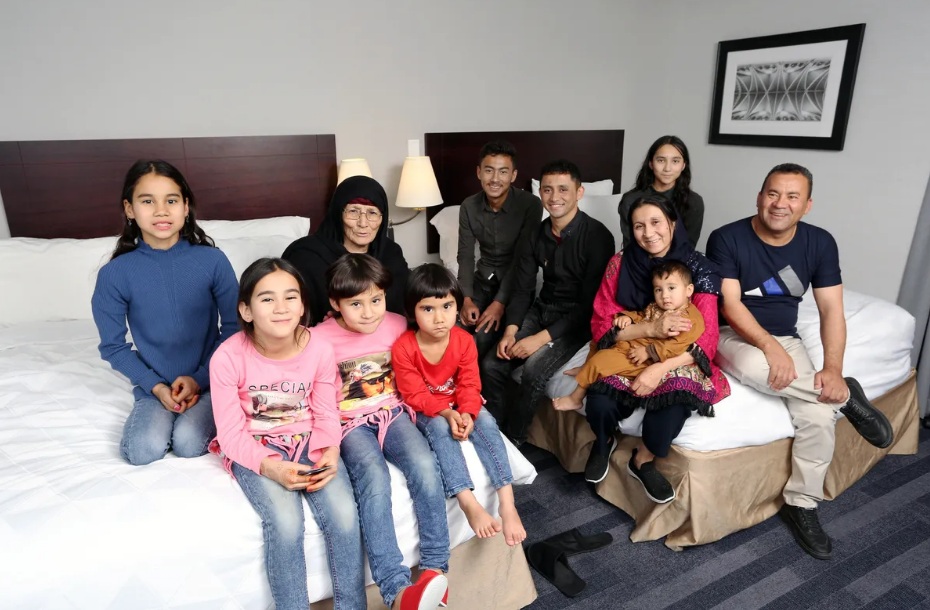Wahid Ibrahimi, who worked as a security guard at the Canadian embassy in Kabul, fled with his family to Pakistan when the Taliban took over. Advocacy group Operation Abraham helped get them to safety.

Wahid Ibrahimi, seated at far right beside wife, Sheikiba, with their family at an Ottawa hotel. On the bed at left are grandmother Gul Pari and Matlohba, 11, Najwa, 10, Zahra 7, and Basbaina, 4. On the right bed are Shahbdain, 16, Mohammad Arif, 17, Mowlodha, 14, and baby Ali Reza, a year and a half old. DAVE CHAN/THE GLOBE AND MAIL
Wahid Ibrahimi’s family gathered in a hotel room in Ottawa on Wednesday evening, exhausted but incredibly relieved, after months of struggling to survive in Pakistan while they waited to come to Canada.
Following many hours of travel, a late-Tuesday landing in Toronto and a trip onward to the country’s capital, Mr. Ibrahimi’s one-and-half-year-old son was sound asleep in his mother’s arms. She smiled as she stroked his hair.
Two of their daughters showed off their henna, intricate designs drawn on their arms at a celebration in Pakistan ahead of their trip.
Just a few months ago, the family’s spirits were at their lowest. They are from Afghanistan, where Mr. Ibrahimi worked as a security guard at the Canadian embassy in Kabul until summer 2021. When the Taliban took over the country, Mr. Ibrahimi feared the new fundamentalist regime would seek revenge on him and his family for his service to Canada. And so they fled to the Pakistani city of Rawalpindi. They had been stranded there for six months when The Globe and Mail first met them, in November.
Shortly before the Taliban takeover, Ottawa had promised Afghans who had assisted with its military and diplomatic missions that they would be able to seek resettlement in Canada under a special immigration program. Mr. Ibrahimi believed his family would be safe in Pakistan while they waited to hear from the Canadian government.
But in Rawalpindi in November, Mr. Ibrahimi and his wife, Sheikiba Muhammad Zahir, recounted horrific attacks on their children.
Their 14-year-old daughter was nearly kidnapped by a motorcyclist when she went to a bakery, they said. And their youngest son, just over a year old, was playing in front of the door to their home when someone threw hot liquid on him that burned and scarred his chest.
Mr. Ibrahimi said his children were targeted because they are Ismaili Hazaras, a long-persecuted religious minority. The entire family of 11 lived and slept on the floor in one small room. They shared one meal a day, doing what they could to survive.
Prior to The Globe’s visit, they were stuck in limbo. Soon after, the advocacy group Operation Abraham, which had already been pressing the Canadian government on the family’s behalf, redoubled its efforts. Before long they were moved to a hotel in Islamabad. They were no longer in a dangerous neighbourhood, and they had warm beds and regular meals. Just over two months later, they were on their way to Canada.
“Sitting on the plane, it was like a dream, coming to Canada,” Ms. Muhammad Zahir said. Mr. Ibrahimi added that when the family learned they were going to Canada, he was “so happy.” He said he couldn’t wait to see the people who had rescued them.
One of their rescuers greeted them at the hotel Wednesday evening. Farouq Samim, a member of Operation Abraham, shed tears at the sight of the group.
“It’s a big relief, oh my gosh. These precious lives. Look at him,” Mr. Samim said, gesturing toward Mr. Ibrahimi. “He served this beautiful country.”
Ottawa lawyer Jacques Shore, another member of Operation Abraham, joined the gathering in a video call. “Our winters are cold, but our hearts are warm,” he said.
Mr. Ibrahimi’s daughter Mowlodha – the 14-year-old who was nearly kidnapped in Pakistan – also expressed joy at being in Canada. She said she would like one day to become a politician like her aunt, Safiya Wazir, a New Hampshire state legislator who relentlessly advocated for the family to be brought to Canada.
Ms. Wazir told The Globe on Thursday she foresaw a bright future for the group. “I’m looking forward to seeing my family thrive and give back to their new community, and to hearing more success stories of struggling families making it to Canada for a second chance,” she said.
Matlohba, Mr. Ibrahimi’s 11-year-old daughter, said she can’t wait to go to school. The children were not enrolled in any formal education in Pakistan. Her 16-year-old brother, Shahbdain, said his plan is to learn English, work hard in school and become a lawyer.
Mr. Ibrahimi said he also has high hopes for his family’s future in their new home. For now, he said, he’ll take any job he can get.
“I served Canada for 12 years,” he said. “My children are here in Canada, so I will work hard to give them a good education so they can serve Canada like I did in Afghanistan.”
The government has promised to bring at least 40,000 Afghans to Canada under two special resettlement programs. Immigration, Refugees and Citizenship Canada says on its website that 27,870 have arrived since August, 2021.
JANICE DICKSON
The Globe and Mail, February 9, 2023
